Turkeys economic fortunes have transformed in the past year. Its business leaders are now justifiably optimistic about the countrys prospects for the future.

|
|
|
Little more than a year ago Turkey was facing a bleak future. Its economy was still reeling from the near-meltdown of 2001 and the effects of the stringent constraints demanded by the IMF as part of its economic rescue package. A potentially prolonged war was beginning in Iraq, one of Turkeys key trading partners. Relations with the United States were strained, to say the least, as a result of Turkeys refusal to accede to US requests in advance of the attack on Iraq.
Through a combination of levelheaded determination and good fortune, Turkeys prospects have changed from bleak to bright. Instead of harming Turkeys prospects, the war in Iraq has actually improved them. Many foreign businesses looking to work in Iraq are setting up shop in Turkey, providing much-needed work for the domestic banking sector. And Turkeys strategic importance, to both the European Union and the US, is becoming increasingly clear. At a recent meeting with a group of Turkish businessmen in Brussels the Belgian foreign minister, Louis Michel, acknowledged that the uncertainty in Iraq meant cooperation with Turkey is inevitable at this point. British Prime Minister Tony Blair has long been an advocate for Turkeys joining the EU and last month was in the Turkish capital Ankara for talks with his Turkish counterpart, Recep Tayyip Erdogan, during which Blair reiterated his determination to bring Turkey into the European fold.The US administration has recently thrown its weight behind attempts by the country to join the EU, and Germanys foreign minister Joschka Fischer echoed the changing views of many in Europe when he said recently, Saying that Turkey cant join the EU no matter what would be a grave error.
Some in the EU are worried that Turkey would be an added burden on a union that they believe is already creaking under the strain after accepting 10 new members at the start of May this year. Supporters of EU integration within Turkey, however, are quick to point out that the countrys youthful population would act as a useful counterbalance to the aging populations of the original European Union members, potentially helping to head off Europes imminent pensions funding crisis.
Turkeys Hard Work Pays Off
It is Turkeys own efforts that have contributed most to its transformed prospects. The government has surprised many with its determination to conform to the IMFs economic reform plan. At the same time the central bank has, through a combination of skillful management and open communication, helped to establish a remarkable level of price stabilitya factor that is contributing to the blossoming of confidence in Turkey among domestic and international investors alike. April figures, for example, showed retail price inflation had fallen to a shade over 10%comfortably below the governments own 12% target for the end of 2004.
Efforts are under way to draw in more foreign direct investment, and huge progress has been made in reforming the banking sectorboth public and private.The government is working on reviving its privatization program, partly by promoting better corporate governance practices in state-owned businesses in order to make them more attractive to potential buyers.
As businesses in Turkey begin to become accustomed to the new political and economic stability, it is hardly surprising that they are looking to the future with a renewed sense of confidence and optimism.
Global Finance gathered some of the key players in Turkeys banking and finance industry at a roundtable in Istanbul.
GLOBAL FINANCE:
Turkeys economy seems to be on a much more stable footing. How has this been achieved and what are its prospects?
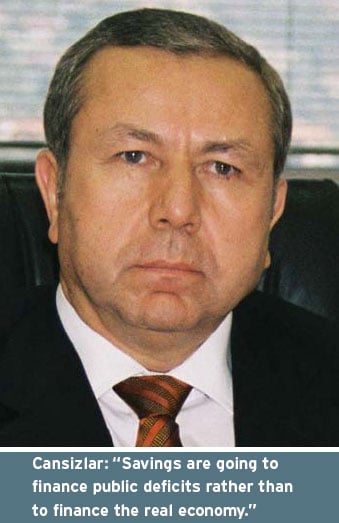
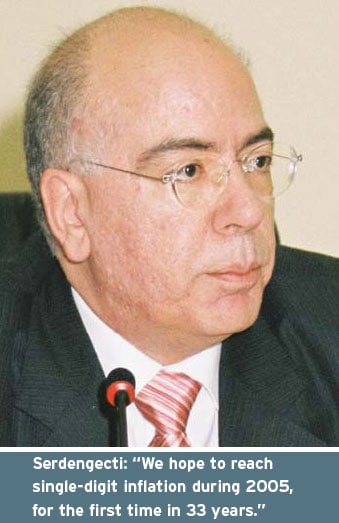
SUREYYA SERDENGECTI,
governor, Central Bank of the Republic of Turkey: We still have a long way to go before we can say we have fully stabilized the economy, but it has stabilized relative to the past. In the past, price stability was not a priority; the priority was either growth or employment or the banking system or the Treasurys borrowing. Over the past 25 years we have had eight stabilization programs, six of which were never completed, one was completed, and the eighth is the one we are implementing today. All these factors have contributed to strong inflation inertia in the economy. What is different today is that we have an independent central bank with a clear mandate to reach and preserve price stabilityand the responsibility for the inflation target is shared with the government. Tight fiscal and monetary policies have been implemented in the past three years, and the central bank and other institutions have developed communications policies that have helped to stabilize the economy.
DOGAN CANSIZLAR,
chairman, Capital Markets Board of Turkey: The most important reason for Turkeys stability is the current political stability. Without political stability, you cant achieve anything.This government is also committed to programs that have helped create stability.
NESLIHAN TOMBUL,
vice president and regional representative,The Bank of New York: We also have a majority government in power, which is following the IMF guidelines very strictly, thereby bringing much needed fiscal discipline. Some international factors have also worked in Turkeys favorglobal interest rates have come down, for example and Turkeys EU aspirations have helped drive changes along social, economic and political fronts.
H. ERSIN OZINCE,
chairman, The Banks Association of Turkey: The domestic financial system and the Turkish banks are positively improving. Benchmarking toward good international standards is helping develop a rationalized and economically efficient banking system.
KUBILAY CINEMRE,
executive vice president, GarantiBank: Turkey has other important anchors than the IMF program. First is EU accession; second is the one-party government, which is an important element because we are going through reforms, not just in the banking sector but the economy in general. Another key factor is that the credibility gap about inflation expectations has changed drastically.That is as important as EU accession itself because it is changing the economic behavior of the Turkish people.
ZEKI ONDER,
executive vice president, Sekerbank: We finally believe now that inflation is under control and that Turkey has a potential of sustainable growth. There may be things that slow us down or speed things up, such as the war in Iraq and the vote on Cyprus, but overall the feeling is very positive.
HUSEYIN IMECE,
executive vice president, Yapi Kredi: Strict monetary and fiscal policies and structural reform have made the Turkish economy much more stable. Prospects for 2004 are positive; continuing political stability and tight fiscal policy will be key.
SERDENGECTI:
Inflation expectations are down to 11.4%.We hope to reach single-digit inflation during 2005, for the first time in 33 years, and we hope to stay under 10%.We have made a lot of progress in the area of fiscal policy, and there is more to come
CANSIZLAR:
The inflation rate and lower interest rates are allowing banks to channel resources into the corporate sector. Now that we have the resources to finance the public sector, the economic prospects are much better.
OZINCE:
The structural reforms in relation to the banking and financial system are helping grow confidence.
TOMBUL:
We still need deeper and bigger capital markets. Unfortunately, the Turkish capital markets are unable to fully serve their purpose.Turkish companies dont really use the capital markets to raise capital and grow their companies. Many Turkish companies are family-owned, but they need to see that if they went public, a 50% shareholding would probably be more valuable than their current 100% share.
CANSIZLAR:
The public sector represents 92% of the total stocks.The private sector is crowded out, so savings are going to finance public deficits rather than to finance the real economy. If we could get that ratio down, then savings would begin to fund the corporate sector. Banks are looking for ways to utilize their resources. There is only one alternative: to finance the corporate sector.
TOMBUL:
The number of investment vehicles is limited. Short-term deposits or funds are used to finance medium- or long-term investments and transactions, often creating a funding gap. Banks and companies should be able to issue commercial paper and local currency bonds into the local system.
SERDENGECTI:
For the past two decades the banks have had to fund the public debt.As the public debt-to-GNP ratio is reduced, banks will be able to extend credit to the real sector. At the same time, the capital markets board will be able to develop new instruments.
GF:
How effective has the IMF economic reform program been?
SERDENGECTI:
It has proved successful, but there is still a lot to do, especially around fiscal policy and structural reforms. There is some discussion whether the government is intending to continue with the IMF.Whether or not we get an accession date from Europe, we must continue.
TOMBUL:
Money is flowing into the country now, but without an IMF program this trend is unlikely to continue.
CANSIZLAR:
There are some items in the program that are difficultfor example, we have to cut back investment expenditure, and that is affecting the economy. The program needs some fine-tuning.
SERDENGECTI:
The program will need tuning, but we have to retain some sort of cooperation with the IMF or the World Bank because that gives the international markets confidence in Turkey, that we are moving forward.
CINEMRE:
The critical period is over. We have covered a lot of ground with the structural reforms, the establishment of independent regulators, the legal and constitutional changes. But we still need the credibility that comes from the program.
OZINCE:
I dont think that any government will regret this, or reject it. It will keep working with the international markets to establish a better way to do things for this country. The end result should be great.
GF:
What is Turkey doing to attract foreign direct investment [FDI]?
SERDENGECTI:
As we develop macroeconomic stability and make changes to the regulations, we will finally be able to attract FDI. Our EU prospects will also help.We have to raise the consciousness in Turkey about the need for FDI, though.
IMECE:
Foreign investors perceive Turkey as a high potential risk country. The amelioration of economic and political risk will improve the FDI flow.The launch of full membership negotiations with the EU will also be helpful in attracting FDI.
CANSIZLAR:
Were establishing a single investment promotion agency so foreign investors coming to Turkey will see only one agency.We are also lifting some restrictions and barriers to foreign investors and capital movement, to create an investment-friendly environment.
TOMBUL:
Turkey is a prime location for foreign investors. The country has resources, a young population and welltrained people. Still, incentives such as tax breaks and low-cost real estate are a necessity. Turkey has always shied away from this because it seemed unfair for local Turkish companies.
CANSIZLAR:
The government has begun providing incentives: Its subsidizing tax and social security premiums and providing free land for investors in some areas, and they lifted the ban on foreigners buying land in small villages.
OZINCE:
We should be more proactive and selectiveabout which sectors we attract investment to.We had some bad experiences in the past, so we need to be careful.
CINEMRE:
Turkey is going to attract huge amounts of FDI; its just a matter of time. It will take one or two successful examples, perhaps in the banking sector where we are already establishing best practice. The financial sector is leading the way.
TOMBUL:
Other important areas will be tourism, assembly of automobiles, consumer-durables and agriculture.
GF:
How is reform of the banking sector progressing?
OZINCE:
It is in a much better position. Asset quality has improved. While NPLs skyrocketed after the crisis of 2001, it was because we changed the regulatory definitions of NPLs. The banking systems profitability has improved, which is why we expect to see more foreign investment in this area.
CINEMRE:
While regulation and transparency are all nice and square, the total amount of the loans and deposits is pretty low. To increase activity within the banking industry we need to remove transaction taxes that in the past have meant a lot of transactions have been contracted outside of Turkey.
ONDER:
Since the consolidation in 2001 things have been moving in the right direction. A key development is that the banking system is moving now into the so-called real banking sector; it is no longer just financing the government deficits.This change will be driven by the growth of the economy. Also, as the economy improves, many of the NPLs will start coming back and becoming good loans.
SERDENGECTI:
The crisis in 2001 made it very clear that we had to go ahead with the banking reform.A lot of progress has been made; restructuring the public sector banks and reform of the private sector banks have been so far successfully conducted.
IMECE:
The non-performing loan problem is under control. However, there is more to be done about the state banks.
CANSIZLAR: In parallel to Basel II they are trying to pass a new law that will lift the limit for deposit guarantees. About $6 billion has already been restructured in the banking sector. And taking into account the foreign interest in the banking sector, it is performing very well.
GF:
The crisis of 2001 was clearly a traumatic and difficult time, but was it actually good for the country in the long run?
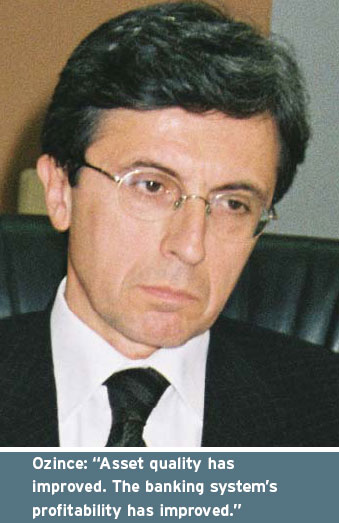
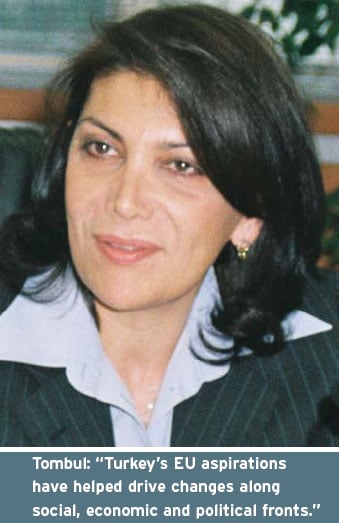
TOMBUL:
We lost 22 banks; it cost the government $60 billion. Thats a high price to pay for an education.
OZINCE:
It was expensive and painful but provided we use the experience
ONDER:
We made good use of that bad experience.
CINEMRE:
It is sad that we had to pay such a high cost, but no country in the world starts at zero with the best financial sector regulation.You have to learn by experience; there is no other way.
SERDENGECTI:
We have learned a lot from what has happened, but it was very costly. In the end we put banking reform at the top of the agenda, and we made the central bank independent.We could have done this before, but the politicians always looked the other way.
GF:
How would you describe the current monetary policy?
SERDENGECTI:
It should be called implicit inflation targeting.We look forward to the day when we will be able to introduce formal inflation targeting. Our primary mandate is and will continue to be price stability.
GF:
How successful is Turkeys privatization program, and what developments can we expect to see?
ONDER:
Turkey has a bad record.We started talking about privatization when everybody did, but now they have all reached their targets and we are still talking about it. Now we are trying to speed up the progress.
CANSIZLAR:
We dont have a successful privatization record, but this government is committed to solving these problems.They are trying to use financial instruments such as IPOs for stateowned corporations and also convertible bonds to get some revenues before they fully privatize corporations. There is also more emphasis on good corporate governance, which should help raise the selling prices.
OZINCE:
There are also positives. Turkey has a sizable stock market and sizable and sound infrastructure. The depth of this market is relatively good, and Turkish savers know stocks and buy stocks.They are very well educated and will be interested in new IPOs.
TOMBUL:
There are valuation issues: The government tends to value its assets higher than the market does. They also fail to see that there are windows of opportunity for new issues, and they need to be ready when the opportunity arises.
CINEMRE:
The prospects are much brighter now for privatization.Turkey is a much more market-based economy, which will be a driving factor, and we have market-based pricing and independent regulatory bodies, which will help.
IMECE:
As with the investment climate, the economic and political atmosphere has affected the privatization process. Now, though, there are ambitious plans to push through privatizations in 2004 ranging from tobacco and sugar to telecom and power companies.
GF:
Is Turkey succeeding in its attempts to prepare for EU accession?
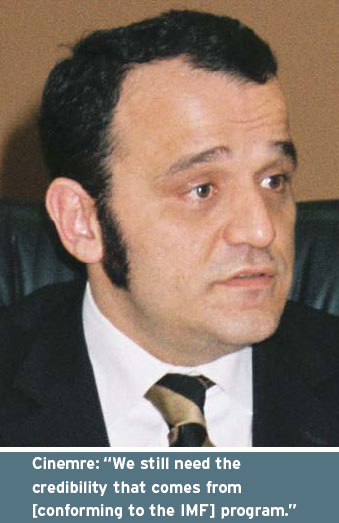
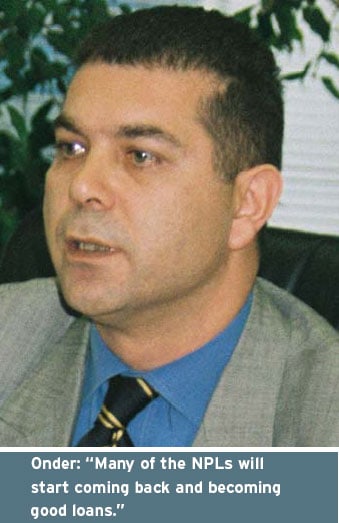
CINEMRE:
Although we are expecting to get a date from Europe at the end of this year for our formal accession to Europe, Turkey has already accessed Europe. This year we are expecting more than $100 billion in import and export trade total, most of which is with European countries.We have a lot of expatriates who have settled in Europe;we have European Parliament members in many countries. The issue is whether we are going to take one step further to complete integration. In the short term the debate is beneficial because it helps accelerate the economic transformation of Turkey. In the long run Turkey and Europe should be working at a higher level of cooperation; it will benefit both parties. If we look at the region that Turkey is in, not just from the geo-political but from a cultural, historic and economic perspective, it is only wise to incorporate Turkey rather than leave it aside.
OZINCE:
Turkey has always defined itself as a partner of Europe. Fortunately, now we are seeing the political will that will lead Turkey to be a very sizable, committed, important partner to Europe.
IMECE:
We are trying to make every reform that the EU requires to open the negotiations, and so far, I think,Turkey has been successful in fulfilling the Copenhagen criteria.
ONDER:
Turkeys getting an accession date will be more a political decision than a criteria-based decision.
TOMBUL:
There is some resistance to Turkey joining Europe. People talk about the free movement of labor, about resources being moved to Turkey, about the population being a burden. But Turkey has huge potential because it has a huge young population that could actually help grow the European economy.
CINEMRE:
Turkey is the only answer to the pension problems that Europe will be facing in the coming years. It can help balance the aging of the European population.
SERDENGECTI:
Reaching economic stability after decades of instability may not be enough as a strong anchor for the economy; further anchors may be needed. EU as an anchor will help further stabilization of the economy and its convergence to the global economy.
CANSIZLAR:
Turkey is doing these things for itself, not just to become a member of Europe. It has already turned its face to the west, not to the east.
GF:
How is the situation in Iraq affecting Turkey?
SERDENGECTI:
We were happy that the full-scale war lasted such a short time, and since then expectations have improved.We are benefiting from that development. How it will positively affect the Turkish economy in the future is still unclear.
ONDER:
It is creating business for Turkey; we have customers that are doing business in Iraq, for example. But it is a sensitive issue; people are suffering.
OZINCE:
I hope we will find a solution in the Middle East, and I hope Turkey will positively contribute to this solution because our business relations are dependent on stability not only in this country but in the region as a whole.
IMECE:
Back in 1989 Iraq was the second- largest trading partner for Turkey. This says a lot about trade and investment opportunities between the two countries. Recent data indicate that trade between the two countries is improving; upcoming stability is likely to improve these business activities.



